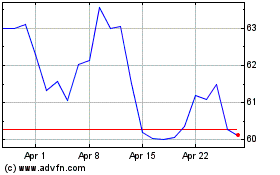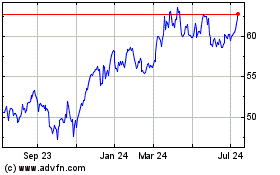Nasdaq's Alternative to Speed Bumps
November 25 2016 - 1:40PM
Dow Jones News
Nasdaq Inc. has become the latest U.S. stock exchange to follow
in the footsteps of its upstart rival IEX Group Inc. with a plan to
hit the brakes on ultrafast electronic trading.
A proposal unveiled by the New York-based exchange giant on
Wednesday would encourage investors to post buy and sell orders on
the Nasdaq Stock Market that last at least one second— eons in
today's markets, where high-frequency trading firms enter and
cancel thousands of orders in fractions of a second.
"What it's really meant to do is improve the ecosystem and the
quality of the market," said Tal Cohen, head of North American
equities at Nasdaq.
Initially, the plan would apply only to orders placed by retail
investors, but Nasdaq aims to expand it to let all market players
participate, the exchange operator said in a filing with the
Securities and Exchange Commission. Nasdaq said it crafted the
initiative to address the needs of long-term investors.
High-frequency traders rarely hold stocks from one day to the
next.
Nasdaq's move illustrates how incumbent players are grappling
with the impact of IEX, which won SEC approval to become a
full-fledged stock exchange in June. Made famous by Michael Lewis's
"Flash Boys," IEX has cast itself as the advocate of investors fed
up with rapid-fire trading. Its best-known feature is its speed
bump, which imposes a delay of 350 microseconds, or millionths of a
second, on all incoming orders. IEX says that helps thwart certain
predatory high-speed trading strategies.
Other exchanges have explored similar features. In August, the
tiny Chicago Stock Exchange proposed its own version of a
350-microsecond speed bump.
Nasdaq Chief Executive Robert Greifeld first indicated that his
firm was exploring an IEX-like feature in July, though details were
adjusted as Nasdaq consulted with market players, the exchange
operator indicated in its filing.
A spokesman for IEX said the firm was reviewing Nasdaq's filing
and not immediately able to comment.
The proposal, which is subject to SEC approval, would allow
investors on Nasdaq's flagship stock market to place "extended
life" orders that couldn't be canceled for at least one second. In
return, such orders would be executed before competing orders at
the same price.
Nasdaq didn't say how long it would take to implement the plan,
saying it was awaiting the SEC's decision before moving
forward.
Potentially, that could lead to "stickier" prices that are less
likely to fluctuate as electronic trading firms cancel or adjust
orders. But before the plan could have such an impact, Nasdaq's
proposal would need to be adopted by its customers. Unlike IEX's
speed bump, the Nasdaq scheme is an option that traders can choose
to use or not each time they place an order.
It would also require a big change to the way Nasdaq prioritizes
incoming orders, which is likely to arouse opposition from
high-speed traders accustomed to the current model.
Currently, Nasdaq and most other exchanges use "price/time
priority" to determine when to execute incoming buy and sell
orders. That means the best-priced orders are filled first, and
when multiple orders come in at the same price, the first ones
received are the first ones executed. In other words, they are
placed in a first-in, first-out queue.
Knowing where one is positioned in that queue has grown
increasingly important to traders in recent years, especially
high-speed firms that constantly adjust their orders in response to
market information, experts say. If a trader is last in line to buy
or sell a particular stock, it is a warning sign that the price is
about to move against them.
Nasdaq's extended life orders would let traders jump to front of
the queue, but only if they are willing to risk letting their order
stay live for a full second. The proposal is expected to be most
attractive to mutual funds, pension funds and other big investors,
which are less sensitive to small price movements and can face
delays if their orders get stuck in long queues.
"This is going to be a very beneficial order type for
institutional investors," said Larry Tabb, founder of Tabb Group, a
market advisory firm.
High-speed traders may be less satisfied with Nasdaq's proposal.
Such firms often engage in market-making strategies, in which they
continuously buy and sell the same stock and collect a small profit
from the difference between the buying and selling price. Market
makers frequently adjust or cancel their orders in less than a
second.
The extended life order type "will increase complexity,
discourage liquidity provision and impede market efficiency," said
Jamil Nazarali, head of execution services for Citadel Securities,
a major electronic market-making firm.
Write to Alexander Osipovich at
alexander.osipovich@dowjones.com
(END) Dow Jones Newswires
November 25, 2016 13:25 ET (18:25 GMT)
Copyright (c) 2016 Dow Jones & Company, Inc.
Nasdaq (NASDAQ:NDAQ)
Historical Stock Chart
From Mar 2024 to Apr 2024

Nasdaq (NASDAQ:NDAQ)
Historical Stock Chart
From Apr 2023 to Apr 2024
